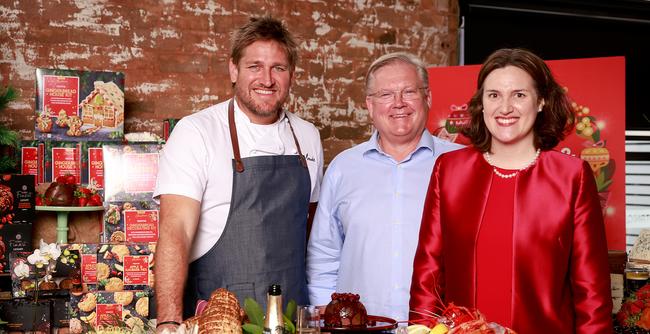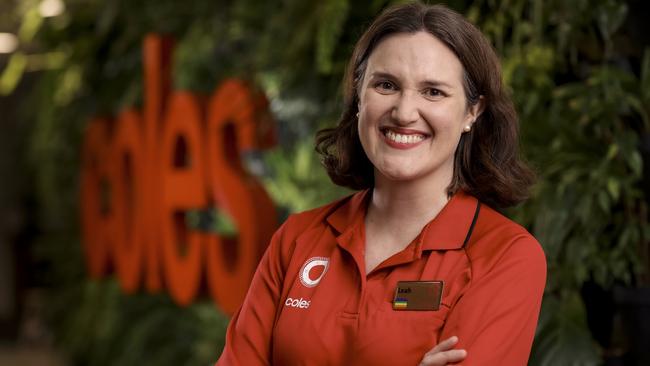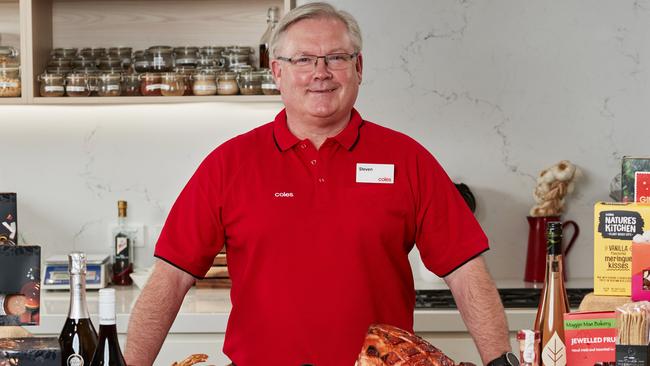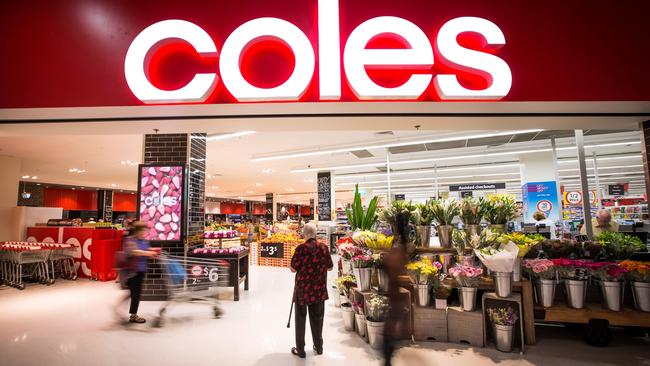Coles promotes Leah Weckert to chief and announces sales rise in cheaper private-label groceries
The 109-year-old supermarket giant has appointed its first female chief at a time when consumers are seeking cheaper private-label groceries.

Business
Don't miss out on the headlines from Business. Followed categories will be added to My News.
Coles will join the growing ranks of Australia’s largest companies led by a woman after former McKinsey consultant, Foster’s beer executive and Harvard graduate Leah Weckert was appointed as the supermarket giant’s chief executive on the retirement of Steven Cain in May.
She will be the first female chief of Coles in its 109-year history and raises to five the number of women leading top-20 ASX companies – the others are Macquarie Group’s Shemara Wikramanayake, Telstra’s Vicky Brady and Woodside Energy boss Meg O’Neill.
Her ascension to running Australia’s second-biggest supermarket chain, where she will oversee the $24bn retailer which has about 130,000 staff, came as a surprise to the market on Tuesday when Coles unveiled its interim results. Mr Cain has been in the role since 2018.
Ms Weckert comes to the chief executive role with intimate knowledge of Coles’ inner workings, having been its chief financial officer when the supermarket was demerged from Wesfarmers and listed on the ASX in 2018.
In 2022 she swapped to the lead commercial role where she was responsible for all key merchandising decisions and which was viewed internally as a key training ground if she were to one day take on the CEO role.
“Leah has an outstanding track record of leadership and driving change inside Coles across key operating areas of the business,” Coles chairman James Graham said on Tuesday.

“I am confident that Leah will maintain the focus of Coles in driving our strategy, building trust with all stakeholders and growing long-term shareholder value. Leah has personal and professional qualities which together with broad business experience uniquely qualify her for the role as our next chief executive.”
She walks into the CEO’s office at a critical time for Coles where she will now have responsibility for the completion and start-up of the retailer’s twin groundbreaking tech infrastructure projects of the automated distribution centres and new e-commerce platform that combined have a budget of almost $1.5bn.
Mr Cain kickstarted the $1bn-plus supply-chain deal with provider Witron and the e-commerce upgrade with Ocado, but said on Tuesday “Coles would be in good hands” under Ms Weckert’s leadership.
More immediately, however, Ms Weckert faces economic challenges to the supermarket business driven by rising interest rates and pressures on household budgets. Coles has observed a significant switch to cheaper private-label groceries in the second quarter.

Mr Cain, who on Tuesday delivered his final financial results for Coles which showed revenue for the half up 4.1 per cent to $21.627bn as net profit rose 17.1 per cent to $643m, said there was a 12 per cent spike in the sales of cheaper private-label groceries in the second quarter.
He described this uplift in home-brand groceries as a “big number” and one of the biggest on record for Coles.
Mr Cain said he expected that more customers would be value conscious as cost-of-living pressures, such as rising mortgage payments and energy prices, increase.
“There’s still plenty of people buying premium food, but there’s also an increased number of people who are clearly on budget and looking for promotions … looking for own-brand (private label), using their Flybuys cards more,” he said.
“And we expect that to continue for at least the rest of the half, if not beyond that and we do feel as though we’ve got a good product mix for the time.”
Ms Weckert said the strong sales in private-label groceries had continued from the second quarter into the new year.

“We have continued to see into the third quarter strong growth in own brands. And we have seen some changes in customer behaviour, and the meat space is one of them; so for example you might see customers trading out of steaks and into cheaper beef cuts, we have seen mince in particular see good growth,” he said.
“Also in some of the core grocery categories, so things like oil, rice and pasta we are seeing really strong growth in own brands as people trade out of proprietary products.”
The half-year result was boosted by a $130m reduction in Covid-related costs to only $20m for the half, with pre-tax group earnings of $1.058bn well ahead of market forecasts of EBIT closer to $987m.
The retailer declared an interim dividend of 36c a share, up from 33c for the same period last year, and payable on March 30.
Jarden analyst Ben Gilbert called it a strong result with the supermarkets arm driving the better-than-expected profit.
“A strong result which we expect to be taken positively by the market. Both top-line and margins trends better, with comments on second half to date trading suggesting like for like growth in food of high-single digit, which should drive consensus upgrades.
“Expect market to be comfortable with CEO announcement with Leah largely accepted to succeed Steve.”
Mr Cain said the good news was that supplier cost inflation was starting to ease in the third quarter, particularly in produce although many of the retailer’s suppliers were still facing increasing cost pressures and shortages of pallets, raw materials and labour.
The supermarket retailer said total supermarkets price inflation of 7.7 per cent was recorded for the second quarter. This compared to 7.1 per cent in the first quarter.
Mr Cain said inflation was expected to moderate from the peak levels seen in the second quarter as the chain begins to cycle second half 2022 inflation and farm related availability improves.
Coles said gross margin of 26.5 per cent increased by 43 basis points period-on-period largely a result of reduced Covid costs, strategic sourcing, product mix and ‘smarter selling’ benefits. These factors were partially offset by investment in pricing and increasing headwinds in markdowns and stock loss as a result of increasing theft.
Supermarkets earnings of $991m increased by 10.6 per cent. Sales at its liquor arm fell 2.4 per cent to $1.952bn as earnings fell 19.2 per cent to $80m.
Coles’ shares ended down 17c at $18.13.
Originally published as Coles promotes Leah Weckert to chief and announces sales rise in cheaper private-label groceries



